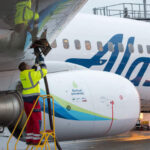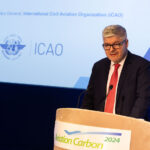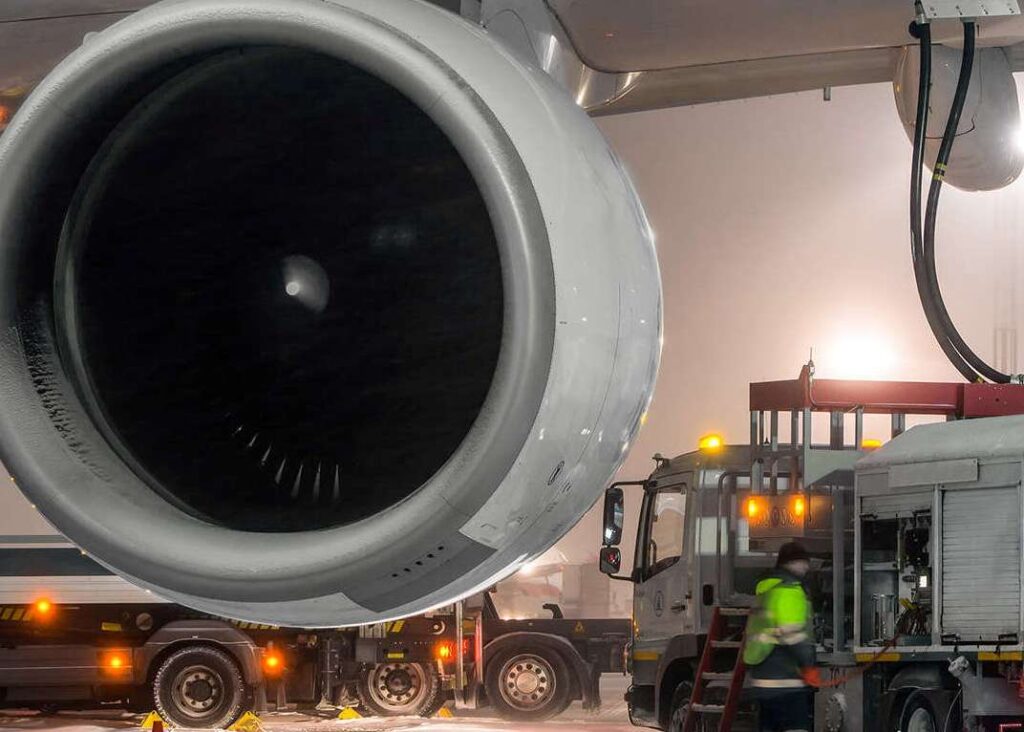Following closely behind the release of the European Commission’s ReFuelEU Aviation sustainable aviation fuel (SAF) blending mandate proposal, the UK’s Department for Transport (DfT) has opened an eight-week consultation on its own proposal for a UK SAF mandate. In common with the EU, the UK mandate would likely start in 2025 and place obligations on jet fuel suppliers but otherwise the two schemes differ in how the mandate should be applied. Whereas the EU requires suppliers to blend a minimum volume percentage of SAF with aviation fuel that rises every five years to 2050, the UK government proposes to prioritise carbon emission savings through a GHG emissions scheme issuing credits proportional to the kilograms of CO2e saved.
“A long-term obligation can generate demand for SAF, provide an incentive to SAF producers (in the form of a tradeable credit) and signal to investors the vital role the government believes the technology will play in the UK,” says the DfT in the consultation document.
The consultation seeks views on the high-level ambition and design of the proposed SAF mandate, the eligibility criteria SAF will need to meet, the interaction between SAF and other domestic and international policies, and the compliance, reporting and verification principles that will steer the subsequent development of the proposed scheme.
Commenting on the launch of the consultation, Shapps said: “There are many complexities to overcome, including how a mandate might interact with international frameworks as well as our own Renewable Transport Fuels Obligation (RTFO), how we set a realistic but ambitious target, and how we balance rapid sectoral growth with supporting the technologies that will be most important in the longer term.
“Some have also suggested that a mandate alone will not be enough to grow a UK SAF industry quickly. Through this consultation, we are also beginning a conversation about whether there is more we can do to provide price certainty for producers looking to build SAF plants and invest in the UK.”
Since 2018, UK SAF supply has been incentivised through the RTFO, which provides fuel suppliers with tradeable certificates for every litre of verified sustainable renewable fuels supplied for aviation in the UK. To avoid the double counting of emissions saved through SAF, the DfT proposes that any SAF supplied under the mandate would not count towards decarbonisation targets from other legislated GHG obligations, either in the UK or abroad, and aviation fuel would therefore be ineligible to receive certificates under the RTFO once a SAF mandate is in place.
The DfT reports that no SAF volumes have so far been claimed under the RTFO and stakeholder feedback has suggested the scheme does not provide an effective contribution towards the cost of producing SAF, in particular when fuel is produced through less commercially developed pathways such as biomass gasification or power-to-liquid.
“As aviation fuel is not currently obligated under the RTFO, there is a risk that without an obligation, only small volumes of the cheapest forms of SAF may be used in the UK,” it adds. “A global SAF market is also developing abroad in response to other market interventions. SAF supply and production could be prioritised in other countries under local mandates and incentives, potentially disincentivising the supply of SAF in the UK.
“Given the environmental and industrial benefits associated with SAF use and production, the government recognises the need for SAF in the short, medium and long term to contribute to delivering net zero and the UK’s carbon budgets. We are therefore keen to tackle the challenges that are preventing the development of the nascent SAF industry. As a consequence, the government is minded to mandate SAF supply in the UK.”
Importantly, rather than mandating a certain percentage of aviation fuel to be SAF over time, as proposed by the EU’s ReFuelEU Aviation initiative (see article), the government says it would prefer to implement a mandate as a GHG emissions scheme based on tradable credits that prioritised carbon savings rather than SAF volumes. This view is supported by the government/industry Jet Zero Council’s SAF Delivery Group and the scheme would prescribe a reduction in the lifecycle GHG emissions intensity of aviation fuel over time (defined as the amount of GHG emissions, on a lifecycle basis, per unit of energy and measured in gCO2e/MJ) through the use of SAF.
It is proposed 89 gCO2e/MJ, which is accepted on an international level, says the DfT, is used as the baseline lifecycle GHG emissions intensity to represent fossil jet fuel. Using this comparator, the minimum GHG saving threshold all SAF would need to meet to be eligible under the mandate should be at least 60%.
Under the proposed mechanism, jet fuel with a GHG emissions intensity below the target and which meets the proposed eligibility criteria, would be awarded a number of credits proportional to the amount of CO2e saved. Jet fuel with a GHG emissions intensity above the target or SAF which does not meet the proposed eligibility criteria would incur an obligation. The lower the GHG emissions intensity of the SAF supplied, the higher the number of credits received.
“This mechanism should encourage supply of SAF with the lowest possible GHG emissions, which we believe a fuel volume-based scheme would not necessarily do,” argues the DfT.
It is proposed the mandate would fall on suppliers of jet fuel to the UK, and “delivered fuels with the highest sustainability credentials.” To count towards the mandate obligation, the SAF supplied in the UK would have to meet DEF STAN 91-091 specifications, the recognised jet fuel specification in the UK. As this refers de facto to the ASTM international fuel standard, SAF would need to be produced through one of the pathways listed in the relevant D7566 Annex.
Only waste-derived biofuels, RFNBOs (renewable liquid or gaseous transport fuels for which none of the energy content of the fuel comes from biological sources), SAF from nuclear origin and recycled carbon fuels would be permitted to contribute towards the mandate obligation under the proposal, so SAF produced from food or feed crops would not be allowed. Feedstocks, including residues, should not be obtained from land with high biodiversity value or land with high carbon stocks in or after January 2008. SAF production must also not direct renewable electricity away from existing applications and where hydrogen is used as a process input, the hydrogen must be low carbon.
To avoid double counting, it is proposed any emission reductions claimed under a SAF mandate cannot be claimed under another GHG scheme such as the UK ETS and CORSIA, although views are welcomed on how the schemes could be used together to continue to incentivise SAF uptake. The government believes a UK SAF mandate and an EU-wide mandate implemented at similar timescales, together with the obligation being placed on all fuel supplied, would reduce the risk of tankering and carbon leakage.
The proposed mandate would start in 2025, by which time, says the DfT, the first large-scale SAF plants should become operational, both in the UK and globally. The performance of the mandate would be considered under UK SAF review points in 2030, for post-2035 uptake, in 2035 for post-2040 uptake and in 2040, for post-2045 uptake, including beyond 2050.
The government says it is likely this consultation, which runs until 19 September 2021, will be followed by a second that would reflect the findings from the first and address more fully the details of administering a mandate. It also encourages views on whether a more comprehensive policy framework is needed to build investor confidence in the UK SAF sector.
Welcoming the consultation, Andrew Morris, CFO of Velocys, which is partnering with British Airways on the municipal waste-to-jet fuel Altalto project in north-east England, commented: “SAF mandates could play an important part in enabling aviation to decarbonise. Combined with mandates, a price support mechanism that ensures stable prices for SAF will go a long way to giving investors the confidence they need to invest in UK SAF production and supply to deliver the UK’s Jet Zero ambition.”
Photo: Velocys















More News & Features
Progress on decarbonising the airline sector has been slow this year, says IATA chief
EASA releases status report on Europe’s SAF production and readiness to meet blending targets
UK government sets out new Jet Zero focus and launches consultation on CORSIA global emissions scheme
New study highlights differing strategies and barriers to decarbonising aviation in UK and Europe
New partnerships formed to drive e-SAF production in Nordic markets
IAG continues to go big on e-SAF as it inks 10-year offtake agreement with Infinium